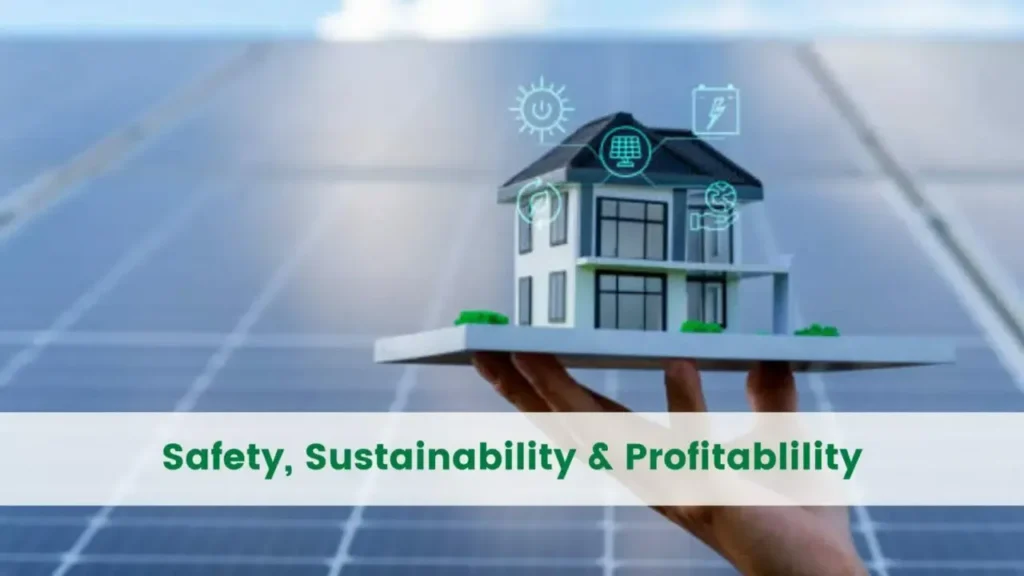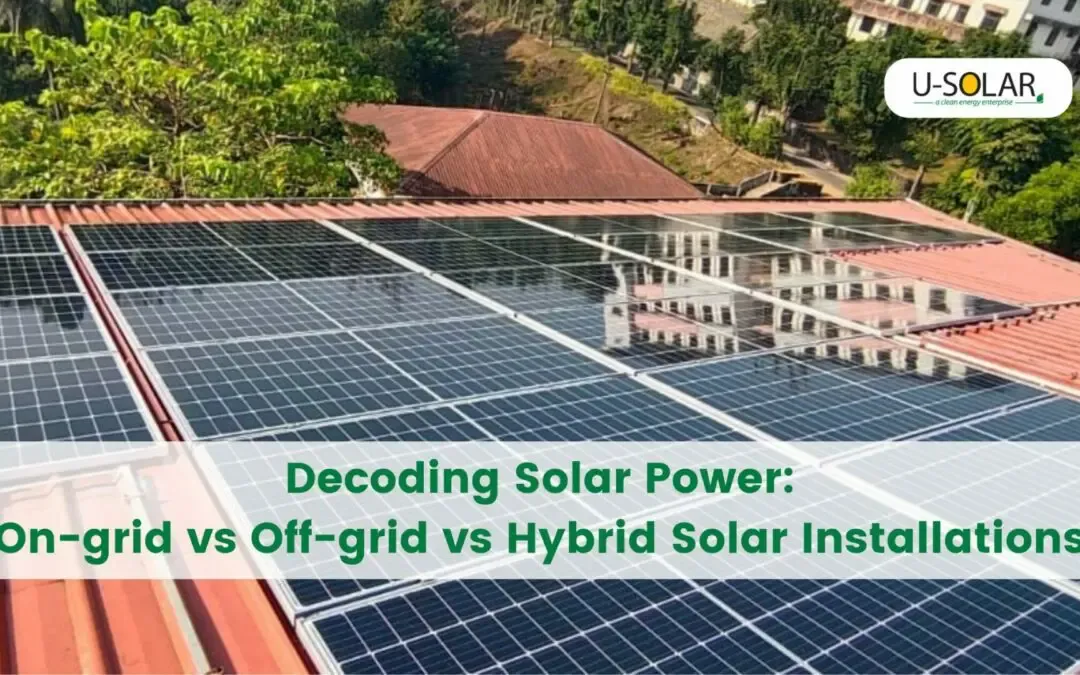Diving into Solar Energy: Understanding On-grid, Off-grid, & Hybrid Installations.
Solar power is becoming an increasingly popular choice for homeowners and businesses alike. It’s no wonder – solar panels offer clean, renewable energy that can significantly reduce your electricity bills and dependence on the traditional grid. But with so many different solar system options available, choosing the right one for your needs can be confusing. This blog will break down the three main types of solar installations: on-grid, off-grid, and hybrid systems, to help you decide which one shines brightest for you.
On-Grid Solar Systems: Grid Power with a Sunny Side
Imagine your roof covered in solar panels, silently converting sunlight into electricity. That’s the beauty of an on-grid solar system. These systems are directly connected to the utility grid, acting like a mini power plant for your home. Here’s how it works:
- Sun shines, panels work: During the day, your solar panels generate electricity.
- Power to the people: The electricity your panels produce is used to power your appliances and lights.
- Excess goes to the grid: If your panels generate more electricity than you need, the excess gets fed back into the utility grid.
- Credits or cash: In many regions, you’ll receive credits on your electricity bill for the extra power you contribute. Some places even offer cash payments for excess solar production.
- Grid as backup: When there’s no sunshine (like at night), you simply draw power from the grid as usual. This ensures you always have electricity, even during blackouts (although your solar system won’t function during a power outage for safety reasons).
Benefits of On-Grid Solar Power:
- Simplest and most affordable option. On-grid systems typically require less equipment compared to off-grid or hybrid systems, making them the most cost-effective choice upfront.
- Easy to install and maintain. Since they connect to the existing grid, installation is generally less complex. Maintenance is also minimal – just keep your panels clean for optimal performance.
- Take advantage of net metering. Net metering allows you to earn credits for excess electricity you generate, reducing your electricity bill or even turning your meter backwards and receiving a check from the utility company.
- Peace of mind with grid backup. You’ll never be left completely in the dark during power outages, as the grid is always there to provide electricity.
Things to Consider for On-Grid Solar:
- Reliance on the grid: On-grid systems depend on the utility company for backup power. During a blackout, your solar system won’t function to power your home.
- Net metering policies vary: Net metering policies and incentives can differ depending on your location. Research your area’s specific programs to understand the potential financial benefits.
Off-Grid Solar Systems: Going Completely Solar
Off-grid solar systems are for those who crave complete energy independence. These systems are not connected to the utility grid and rely solely on solar power to meet your energy needs. Here’s the off-grid setup:
- Solar panels are king: Off-grid systems typically require more solar panels than on-grid systems to generate enough electricity to power your entire home throughout the day and night.
- Battery backup is essential: Since there’s no grid backup, you’ll need a robust battery bank to store excess solar energy for use during non-sunshine hours.
- Energy management is key: Living off-grid requires a more mindful approach to energy consumption. You’ll need to prioritize energy-efficient appliances and potentially adjust your daily habits to fit your solar generation.
Benefits of Off-Grid Solar Power:
- Ultimate energy independence: Off-grid systems offer complete freedom from the utility company and fluctuating electricity costs.
- Resilience during power outages: With a properly sized battery bank, you won’t be affected by blackouts, making off-grid ideal for remote locations with unreliable grid access.
- Environmentally conscious choice: By relying solely on solar power, you minimize your carbon footprint and contribute to a cleaner environment.
Things to Consider for Off-Grid Solar:
- Higher upfront cost: Off-grid systems require a significant investment due to the additional batteries needed.
- More complex installation and maintenance: Designing and installing an off-grid system is more involved compared to on-grid systems. Regular maintenance of batteries is also crucial.
- Lifestyle adjustments might be necessary: Living off-grid may require changes in your energy consumption habits to ensure you have enough stored power, especially during low sunlight periods.

Hybrid Solar Systems: Striking a Balance
Hybrid solar systems combine the advantages of on-grid and off-grid systems. They connect to the utility grid for backup power but also include a battery bank to store excess solar energy. This offers a balance between energy independence and grid security.
Here’s how a hybrid system works:
- Solar power takes priority: Similar to on-grid systems, your home prioritizes using the electricity generated by your solar panels.
- Batteries store the surplus: Excess solar energy is stored in the battery bank for later use.
- Grid as a backup: When your batteries are depleted or during periods of low sunlight, the system automatically draws power from the grid.
- Net metering benefits: Hybrid systems can still qualify for net metering programs, allowing you to earn credits for excess electricity fed back to the grid.
Benefits of Hybrid Solar Power:
- Increased energy independence: With battery backup, you have more control over your energy use and are less reliant on the grid, especially during power outages.
- Maximize solar energy use: Hybrid systems allow you to store excess solar power for later use, reducing your dependence on grid electricity.
- Peace of mind with grid backup: Even if your batteries are depleted, the grid is always available as a backup source of power.
- Potential for future expansion: Hybrid systems can be easily expanded by adding more battery storage capacity as your needs evolve.
Things to Consider for Hybrid Solar:
- Higher upfront cost than on-grid systems: The inclusion of batteries increases the initial investment compared to on-grid systems.
- More complex than on-grid systems: Hybrid systems involve additional components (batteries) and require more complex system design and management.
Choosing the Right Solar System for You
The best solar system for you depends on your specific needs, budget, and lifestyle. Here are some key factors to consider:
- Energy consumption: Analyze your typical daily and seasonal electricity usage to determine the size of solar panel system and battery bank you’ll need.
- Sun exposure: The amount of sunlight your roof receives will significantly impact the amount of electricity your solar panels can generate.
- Budget: Consider the upfront costs of different systems, including installation, equipment, and potential ongoing maintenance needs.
- Net metering policies: Research your area’s net metering programs and potential financial incentives to see if they influence your decision.
- Energy independence goals: How important is complete freedom from the grid to you? If blackouts are a major concern, a hybrid or off-grid system might be a better choice.
Conclusion
Solar power offers a sustainable and cost-effective way to generate your own electricity. By understanding the different types of solar systems – on-grid, off-grid, and hybrid – you can make an informed decision that best suits your energy needs and lifestyle. Whether you crave complete energy independence or prefer the simplicity of a grid-connected system, there’s a solar solution that can brighten your future!
Need Professional Consultations?
At U-Solar, we offer expert consultations and services designed to keep your solar panels in prime condition and functioning at their best. Our team of certified professionals specializes in a comprehensive suite of maintenance services, from intricate electrical and structural inspections. We understand that each solar installation is unique, and we tailor our approach to meet the specific needs and challenges of your system. We ensure that your solar power system remains efficient, reliable, and capable of delivering maximum energy output.
Contact us today to learn how we can help you achieve optimal solar power performance through professional maintenance solutions.


